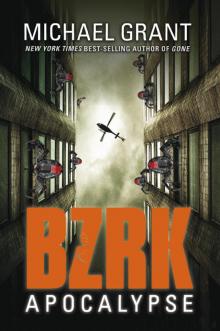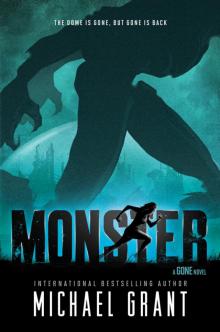- Home
- Michael Grant
Front Lines Page 35
Front Lines Read online
Page 35
She comes to rest, hugging the sand as the battle rages on ahead of her, drawing slowly away as the column continues to try and escape. She remains flat as a platoon of German soldiers race past, rushing to flank the attackers.
The ambulance rolls on for a bit, slower, slower, and finally comes to rest. A tire is burning, billowing toxic black smoke that rises to obscure the stars.
In the east the faint gray dawn is a signal of more terrible sights to come.
37
RIO RICHLIN—TUNISIAN DESERT, NORTH AFRICA
The grenade lands at the lip of what had been Jenou’s foxhole. It lies there looking like a small steel pineapple, two seconds gone, two more, tick-tock.
The nearest German sees it, reaches for it, picks it up, starts to throw it back. The explosion amputates his arm at the elbow and shreds his helmet and face.
The German stands there, already dead but not yet fallen, frozen in the flare light, looking as if some gigantic tiger with claws of steel has ripped the side of his face.
Rio stands, staring. Her rifle leans against the inside of her foxhole, forgotten. She is looking at a monster. There is a terrible curiosity, a can’t-look-away horror blended with denial because such things simply did not exist, her mind will not accept it, and a second German soldier farther back roars hatred and raises his machine pistol toward her, the deadly barrel spitting bullets.
And . . . empty.
She hears the metal-on-metal click of an empty chamber and the soldier throws his machine pistol aside in rage, draws a dagger from a sheath strapped to his leg, and runs at her.
He is a big man, brown eyed. She notices that because so many of the Germans have blue eyes, but no, these are brown. He is missing two teeth, which makes his snarl seem almost comical. His uniform is filthy, streaked with mud and coated with a thick layer of dust. His hands are big, thick fingers gripping the hilt, big boots slamming the sand, propelling him forward, roaring, always roaring, like a beast.
“Richlin! Down!”
The voice is far away and means nothing.
In three steps she will—
Down, down, down!
Where has that voice come from? Is it a voice at all? For a fleeting split second she thinks it’s her father, and then, a sudden, urgent spasm, like a lightning strike, and she drops to her knees as Jack fires. She feels the breeze of his bullets.
The big German staggers forward, carried by momentum. He swings the knife and Rio feels something like a punch in the arm, and then is buried beneath the German’s body.
She is on her back, squashed down into her shallow foxhole, crushed by two hundred pounds of dead man exhaling his final breath into her ear.
Something snaps. Rio hears it as a snap, feels it as a twig breaking, and all at once she is pushing and punching and screaming foul curses and blasphemies, while all around her the guns blaze on. A second grenade goes off, and at last she breaks free and pushes herself up, drags her rifle from beneath the dead man, and starts firing again, screaming all the while, screaming, “Die, you fugging bastards!”
She fires until her clip pops.
Then . . . silence.
“Hold your fire, hold your fire!” Cole’s voice.
A single shot followed by a louder Cole, yelling, “Goddammit, I said hold your fugging fire!”
Morning has come.
A white flag has appeared.
Rio stands with her rifle in her hand, legs still pinned by the dead man at her feet.
The man with the face ripped apart by Rio’s grenade slides slowly down into Jenou’s foxhole.
“Are you okay?”
Rio’s hearing is half gone, her comprehension gone further still. The world around her seems to vibrate. The light is unreal.
A hand touches her arm and she flinches; the hand does not pull away but tightens its grip. “Honey, are you okay?”
Rio stares at Jenou, blinks at her as if there is something about this person she should recognize, but she can’t quite place the face.
“Who shot him?” Rio asked.
“What?”
“Who shot him? This one.” She looks down and carefully begins disentangling her feet.
“I think it was Stafford.”
A sharp sob. Rio takes several deep breaths, but the trembling is upon her again, the same as her first shots, her first kill. Tears come fast and hot, streams of mud down her cheeks. She dashes them away and shakes her head and throws off Jenou’s comforting hand.
“I’m okay,” Rio says.
“Yeah, well, I’m not,” Jenou admits softly. “I can’t do this, honey. I’m not made for this like you are.”
It’s not meant as an insult, it is admiring and a little awestruck, but Rio flares and says, “Don’t say that, Jen. Don’t say that, we are . . . we’re . . . I’m okay. I’m okay. You’ll be okay.”
For that moment Rio has convinced herself that she is done, that she has performed her duty. She has done all that can be asked of her. She closes her eyes and she is home. She is home, she is in the barn with her mother, and they are laughing while the cows moo in outrage, demanding to be milked.
Her father is there, too, but not laughing. We’re your family. Whatever happens, we’re your family. Whatever happens, this is your place, this house, this town.
You’ll need that.
Sergeant Cole yells to Luther and Pang to check the German bodies. “The dead ones, make sure they’re dead, then strip them of their water and food. Any that are alive take their weapons, use their bootlaces to tie them up.”
“Aw, why can’t Richlin do it?” Luther complains.
“She’s the one who made them dead, most of ’em,” Cole says. “You just make sure they stay that way.”
38
RAINY SCHULTERMAN—TUNISIAN DESERT, NORTH AFRICA
Three German vehicles are burning, more are disabled, and the dramatic pink light of morning highlights a white flag flying from the antenna of one of the surviving tanker trucks.
“Well, I will be well and truly damned,” Sergeant Garaman says to Cole, shaking his head in disbelief at the carnage there at the end of their line. “You got some people who can fight, Jedron.”
“That I do.”
Rainy, no longer able to tolerate hugging the sand at a safe distance, has crawled forward. She sees helmets barely poking above foxholes. She sees Garaman standing, shielding his eyes, peering intently. Then she sees the bodies, maybe a dozen in German uniform, lying in the weird and horribly comic poses of violent death.
“I need ammo!” Sticklin shouts.
“Magraff, distribute ammo!” Cole shouts. “Pang, give her a hand.”
Geer, his voice choked, says, “My kitten! Miss Pat!”
Rainy risks standing herself and realizes the toll fear has taken on her: her muscles scream from tension and rigidity.
“What now, Sergeant?” Rainy asks Garaman. “Where’s Lieutenant Helder?”
“Deader than hell, Headquarters.”
“Shit,” Cole says. “He was okay. I guess you’re it, Garaman.”
“I fugging know it,” Garaman says bitterly. “Okay, I’ll tell you what’s next, Headquarters, we blow the hell out of the remaining trucks, scrounge what we can, and get the fug out of here before that tank column shows up.”
Off to the southeast a sandstorm whips up intermittent tornadoes, a brownish smear across the horizon, dirtying the sunrise, but it’s a mile off and not heading this direction.
Rainy says, “Sarge, I’m with S2 and I want to look for papers, maybe interrogate some prisoners.”
Cole snorts and shakes his head. “Well, I sure wouldn’t want to harm the war effort by denying you the opportunity, Sergeant . . . what was your name?”
“Schulterman.”
“We’re just going to make sure this isn’t a trick and . . .” He falls silent because three German soldiers are carrying the white flag forward. One appears to be a senior officer.
Weapons are trained on
the advancing enemy but no one fires, and a sort of collective sigh of relief rolls down the line. Rainy hears relieved laughter, nervous and uncertain.
Cole lights his stubby cigar with his Zippo and to Garaman says, “All right then, boss, what is the protocol for accepting the surrender of an enemy officer?”
Garaman lights one of his foul cigarettes. “See, that’s why we need officers, to handle this kind of—”
“Sarge,” a man from Third Platoon says, high-strung and upset. “We got wounded. Six men, two of which is a woman. I mean, two are women, plus four men.”
“Well, we ain’t got a doc, so you’re going to have to do what you can. You got any medical skills, Headquarters?”
“No,” she says. Rainy is not about to let herself be turned into a nurse. That is a German colonel advancing under the flag of truce, and she is determined to do her job as a military intelligence sergeant.
Said German colonel stops fifty feet away. He speaks no English, so Rainy avoids nursing duty by stepping in as translator.
“He says he’s Colonel Von Holtzer and he wants to see our commanding officer,” she says.
“Tell him we ain’t got a commanding officer, just us lowly noncoms.”
This news is not well received. There’s a desperate look in Colonel Von Holtzer’s eyes, a kind of panic that is quickly papered over by practiced arrogance. Through Rainy, he says, “I cannot surrender to common soldiers.”
“I see,” Garaman said, cracking a rare grin.
Cole said, “Tell the colonel we are going to blow up his fugging trucks and he can either disarm his fugging men and send them down the road and no one gets hurt, or we can resume fire.”
After a brief back and forth, Rainy says, “He’ll do it, but only if you don’t insist on formal surrender.”
Garaman said, “You tell the colonel—”
“Sarge,” Rainy interrupts, “I need to be able to question any officers.”
Sergeants Garaman and Cole blow different fragrances of smoke toward her and favor her with nearly identical looks of irritation. But then Garaman shrugs.
“Tell the colonel we reserve the right to question any officers. But aside from that we have no interest in taking prisoners. We’ll leave him with what food and water we can spare, and nothing else.”
The colonel is clearly worried and unconsciously glances back toward his burning vehicles and men.
Rainy says, “I’m not sure this guy’s in charge. He seems awfully nervous. I would suggest we take his offer, but keep our eyes open—there may be another colonel—even a general—hiding among the men.”
It is a shrewd guess, and Rainy is flattered by the surprised appreciation in Garaman’s eyes. Cole nods agreement.
“All right, Headquarters. We’ll secure the column; you take a couple of Cole’s people and check it out. Tell the colonel here to order all his men to drop arms and move north away from the vehicles. If there’s any trouble—I mean if we see so much as a souvenir dueling pistol—we will open up on them and kill every last one of the bastards.”
Which is how Rainy ends up trudging across the desert toward the Germans with Rio Richlin and Jack Stafford, once Cole has waved an all-clear.
They have covered half the distance when a single person appears, walking out of the sunrise.
Stafford trains his rifle. Rio levels hers from the hip.
Rainy calls out something in German, but almost immediately realizes that this is definitely not a German.
“She’s a Negro,” Rio says.
“Yes, I just noticed that,” Rainy says. “And a woman.”
“The Germans are not fond of blacks, or women,” Stafford points out.
Rio calls out, “If you’ve got any weapons, drop them right now.”
“Private Frangie Marr. I was being held prisoner.”
“Put your hands down, Private,” Rainy says. She looks closely at the small young black woman. “You look like you’ve been through it.”
“Hey,” Rio says. “Don’t I know you?”
Frangie tilts her head and looks at her quizzically, then her face brightens. “Seen any wild pigs out here?”
“I have not,” Rio says, breaking into a grin.
“Where’s that big old hillbilly who was with you?”
That kills the smile on Rio’s face. “Kerwin Cassel. He, uh . . .” She shrugs.
Frangie understands immediately. “I am sorry to hear that. He seemed like a good guy.”
“Yeah. Yeah, he was. He was a good guy.”
The four of them stand awkwardly until Jack says, “I’m not sure I’m enjoying this war.”
That coaxes a rueful nod from Rio and Frangie. Rainy fidgets impatiently, but she says nothing, acutely aware suddenly of a yawning gap between herself and these soldiers who have seen real combat, who have fired guns in anger.
Rainy looks thoughtfully at Frangie. “You were a prisoner? You see that colonel standing over there? Is he the commanding officer?”
Frangie closes her eyes, an aid to memory, and a response to exhaustion, exhaustion somehow made more profound by the relief she feels at being back with American troops. “Him and another guy in a different uniform. Black uniform.”
Rainy feels predatory excitement. “An officer in a black uniform?” She points at her collar. “SS?”
“Yep,” Frangie confirms. “He’s the one that shot my patient, lying on a table, his stomach all messed up. Ordered one of the soldiers to shoot him in the head.”
“Waffen SS. They’re a whole separate army. Fanatics. The worst of the worst.” To Frangie she says, “I imagine you’d like to grab some chow and take a nice long nap, but can you walk with us through those Krauts?”
So they are four when they enter the mass of angry, resentful, worn-out Germans. The Germans are under the guns of a dozen Americans armed with rifles and submachine guns. Other soldiers are gleefully looting trucks, digging out anything that can be eaten, drunk, or considered a souvenir.
Rainy speaks German as she walks through the sullen mob. “You men have nothing to fear, we don’t shoot prisoners. As long as you cause no trouble, we’re going to let you walk away. I just want the officers.”
She watches eyes flick involuntarily, but not toward the two lieutenants and the major standing together and trying to look dignified in the face of defeat. Nor do they glance toward Colonel Von Holtzer, who stands aloof, face mirroring the self-justifying internal dialogue he’s assembling for his superiors.
No, the eyes dart toward a corporal in blood-stained khaki who sits on the sand surrounded by other men, all stiffly ill at ease.
Rainy walks directly to this man, who refuses to look up.
“That him?” Rainy asks Frangie.
“I can’t see his face.”
Stafford steps forward and uses the barrel of his rifle to push the man’s head back.
“That’s him, and he speaks English,” Frangie confirms. “What happened to the fancy boots, Colonel?”
“Go on, shoot me,” he said, rising to his feet, defiant. “Kill me and be done with it.”
“Doc, they’ve got chow and wounded back there,” Rainy says to Frangie, who gratefully takes the hint.
“I wasn’t planning on killing you, Colonel . . .” Rainy lets the question hang.
“SS Colonel Von Kleeberg,” he says. “Where are your officers? I demand to see them.”
“Nah, you don’t want to see them,” Jack says.
“So I am to be questioned by a . . . a . . . female sergeant?”
Rainy does not see the smile on her own face, but Rio and Stafford do, and their opinions of the sergeant from headquarters change dramatically. Headquarters does not like SS officers, no she does not.
“Not just a female, Colonel. A Jew. Sergeant Rainy Schulterman. Hebrew.”
The colonel’s hauteur slips and there is a mix of hatred and dread in his eyes that Rainy enjoys immensely.
That’s right, asshole, one of those people.
The colonel spits at her. It hits Rainy on the cheek and slides down her face, cleaning a path through the dust as it does.
“Happy to shoot him for you, Headquarters,” Jack says cheerfully.
“No, that’s what he wants. Then his little blond children and his wife and his mistress can all tell themselves he died a warrior’s death.” Rainy does not bother to wipe off the spit; she leaves it there, evidence of her indifference.
She considers for a moment, then says, “I won’t kill you, Colonel, you’re a potentially valuable asset. You weren’t here for the supplies, you were joining the tank column. Replacement commander, right? You’re coming with us. But first you’re taking off those boots and the pants too.”
“I don’t take orders from filthy Jews.”
Rainy gives no order and is frankly shocked when Private Rio Richlin swings the butt of her rifle into the side of the colonel’s face. It’s not enough to kill or even render him unconscious, but it staggers him and blood seeps from his ear.
Rainy gives a slight nod to the fierce young woman and notices a troubled frown on Stafford’s face.
In the end they march a bootless, pantless SS colonel back to the platoon and present him to Sergeants Garaman and Cole.
“This piece of shit is an SS colonel who had an unarmed, wounded American captain shot through the head. We’re taking him with us,” Rainy says, defiant, expecting them to argue.
The two sergeants nod contentedly as they peer at the swelling bruise on the side of his head, then at his state of undress, and finally, as though they have synchronized their movements through long practice, turn to look at Rainy Schulterman.
“One other thing, gentlemen,” Rainy says. “Some of those trucks are still working. If you squeezed your people in tight . . .”
“We could ride on out of here,” Sergeant Cole says. “Yeah, we already thought of that.”
“Might not be room for the prisoner, though,” Rainy says.
“Might not be.”
“Might be you could tie him to the bumper. He looks healthy enough to run.”
“Now I know why they never let women fight wars,” Sergeant Garaman says. “Too mean.”

 Fear
Fear Plague
Plague BZRK: Apocalypse
BZRK: Apocalypse Bzrk
Bzrk Love Sucks and Then You Die
Love Sucks and Then You Die Silver Stars
Silver Stars The Key
The Key Front Lines
Front Lines BZRK Origins
BZRK Origins Monster
Monster Gone
Gone The Snake
The Snake The Power
The Power Hunger
Hunger Lies
Lies A Sudden Death in Cyprus
A Sudden Death in Cyprus Messenger of Fear
Messenger of Fear Eve & Adam
Eve & Adam The Trap
The Trap Light
Light An Artful Assassin in Amsterdam
An Artful Assassin in Amsterdam The Call
The Call Hero
Hero Soldier Girls in Action
Soldier Girls in Action Purple Hearts
Purple Hearts The Tattooed Heart
The Tattooed Heart The Fall of the Roman Empire
The Fall of the Roman Empire BZRK Reloaded
BZRK Reloaded Messenger of Fear Novella #1
Messenger of Fear Novella #1 The Magnificent 12
The Magnificent 12 Fear: A Gone Novel
Fear: A Gone Novel Villain
Villain Manhattan
Manhattan Eve and Adam
Eve and Adam Plague: A Gone Novel
Plague: A Gone Novel Fergie Rises
Fergie Rises In the Time of Famine
In the Time of Famine Hunger_A Gone Novel
Hunger_A Gone Novel Lies g-3
Lies g-3